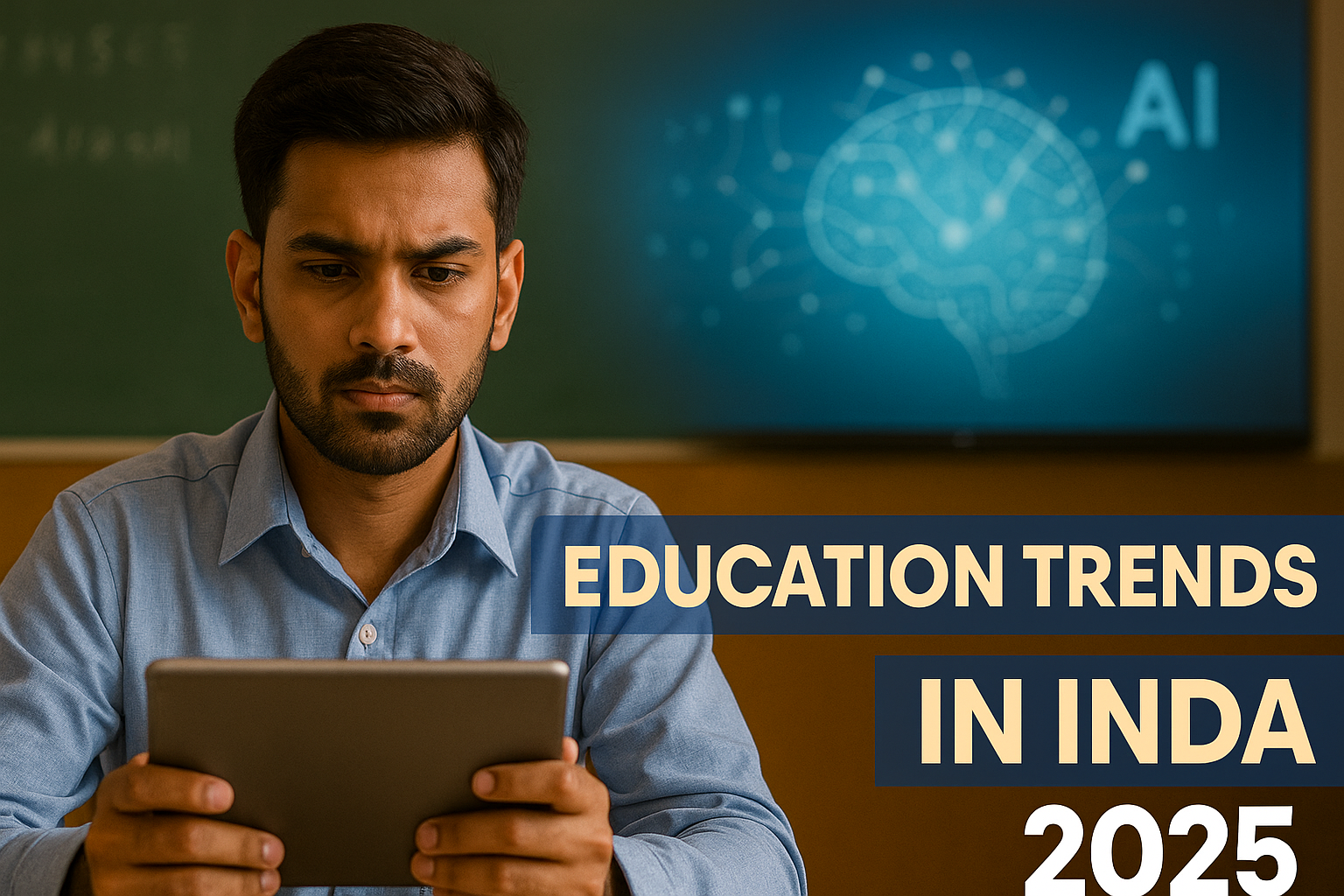📘 Introduction
Education in India is undergoing a dramatic transformation in 2025. The rise of AI-powered learning tools, the revival of Indian Knowledge Systems (IKS), and the push toward blended or hybrid education models are reshaping how students learn. Add to that government-backed e-learning infrastructure, international campuses, and a strong focus on student well-being—it’s a pivotal time to be in education.
Let’s dive into the latest trends driving India’s educational evolution, backed by data, official sources, and expert insights.
1. 🌐 AI & EdTech ≥ Personalized & Immersive Learning
- AI Tools Surge: EdTech platforms are now embedding AI tutors, adaptive content, and automated grading—part of India’s ₹10 billion EdTech boom.
- AR/VR Experiences: Classrooms are opening portals into history and science via virtual reality, boosting retention and engagement.
- Virtual Labs: Institutes like IIT Kanpur are building virtual labs and simulations to democratize access to STEM education.
2. 🏫 Blended / Hybrid Learning Models
- Multiple universities, including JNU, are enhancing their digital infrastructure—e-learning centers, virtual classrooms, and content studios—to support a hybrid format that blends online and offline learning.
- A global survey indicates 70% of Indian institutions are adopting hybrid classrooms for flexibility and inclusivity.
3. 📚 Indian Knowledge Systems (IKS) Revival
- Under NEP 2020, Indian curricula include IKS modules. CIKTSI at IP University and Rajasthan school reforms emphasize cultural heritage and traditional subjects.
- By 2025, UGC aims to have 1.5 million teachers trained in IKS methods.
4. 🎓 Global Collaboration & Foreign University Campuses
- Maharashtra recently issued LOIs to five foreign universities (Aberdeen, York, IIT, etc.) to open campus branches in Navi Mumbai with 25‑30% lower fees.
- DU’s expansion to underserved areas (Fatehpur Beri, Surajmal Vihar, Dwarka) strengthens access for local communities.
5. 🌱 Skill-Based Learning & Micro-Credentials
- There’s a 27% surge in science–stream enrolments linked to state initiatives like Namo Lakshmi/Saraswati.
- Skill-based education is gaining traction through vocational modules, short-term certifications, and micro-credentials aligned with NEP.
6. 💬 Social & Emotional Learning (SEL) and Mental Health Support
- Delhi’s Happiness Curriculum and UGC’s drug awareness modules help nurture emotional intelligence, life skills, and resilience.
- SEL adoption is increasing to support holistic well‑being in the classroom.
7. 🍃 Sustainability & Environmental Education
- Experiential and outdoor learning practices (gardening, fieldwork) address climate consciousness and environmental responsibility in curricula.
- Educational institutions are launching green campuses and climate-related coursework
8. 👩🏫 Teacher Rationalization for Remote Areas
- Chhattisgarh is reallocating teachers from surplus urban zones into remote communities to close staffing gaps.
- UP is launching smart schools, ICT labs, and digital libraries to uplift rural education.
9. 💼 Professional and Vocational Education Expansion
- IGNOU’s new AI-powered MBA programmes (Odia & Hindi) break language barriers in tech education.
- Symbiosis is exploring interdisciplinary AI programmes to democratize AI learning
📘 Case Study: JNU’s ₹11 Crore E-Learning Centre
- A state-of-the-art digital education center at Jawaharlal Nehru University, complete with studios, virtual classroom space, and a tech‑incubation unit, is in development.
- This demonstrates the institutional adoption of hybrid infrastructure.
🔍 Backlink Opportunities
- NEP 2020 policy details on the Ministry of Education (moe.gov.in)
- IP University’s CIKTSI announcements
- CBSE Happiness Curriculum page
- UGC modules & SWAYAM portal
- JNU’s E-Learning Center update
🛡️ Disclaimer
Disclaimer: The content is based on official statements and credible news sources. While data is accurate as of June 2025, readers should verify dates and details with original institutional portals. Times of Globe does not guarantee future material accuracy.
📌 Tips for Educators & Institutions
- Adopt AI-enabled EdTech tools like adaptive practice and AR simulations.
- Blend online and offline learning to maximize inclusion.
- Introduce IKS modules for cultural grounding.
- Include SEL & sustainability education in lesson plans.
- Open industry tie-ups, foreign university collaborations, and smart campus projects.
✅ Conclusion
India’s education system is experiencing a profound shift: one that includes AI, hybrid classrooms, cultural education, mental health, sustainability, and international collaborations. 2025 is poised to be a breakthrough year—ideal for educational institutions, students, parents, and startups to tap into these powerful trends.





2 thoughts on “Top Education Trends in India 2025 – AI, IKS, Hybrid Learning & More”